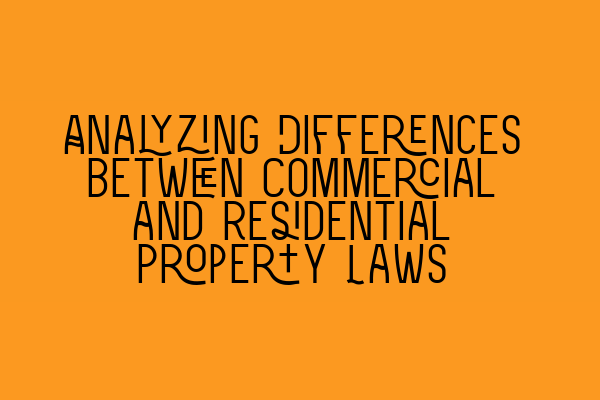Analyzing Differences between Commercial and Residential Property Laws
When it comes to property law, there are distinct differences between commercial and residential properties. Understanding these differences is crucial, as it can greatly impact your rights and obligations as a property owner or tenant. In this article, we will dive deep into the key dissimilarities between commercial and residential property laws, shedding light on the unique aspects of each.
Residential Property Laws
Residential property laws govern properties that are primarily used for dwelling purposes. These can include houses, apartments, condominiums, townhouses, and other residential units. The key objective of residential property laws is to ensure the protection and well-being of individuals and families who reside in these properties.
Some of the primary aspects of residential property laws include:
1. Tenancy Agreements and Leases: Residential property laws often regulate tenancy agreements and leases, which outline the terms and conditions of the occupancy. These agreements detail the responsibilities of both the landlord and the tenant, including rent payment, maintenance obligations, and termination requirements.
2. Security of Tenure: One of the most significant aspects of residential property laws is the concept of security of tenure, protecting tenants from arbitrary eviction. These laws prevent landlords from evicting tenants without a legitimate reason and without following the proper legal procedures.
3. Rent Control: In some regions, residential property laws may include rent control provisions to regulate rent hikes. These provisions aim to ensure that rental rates are fair and reasonable, preventing landlords from exploiting tenants by charging exorbitant rents.
4. Housing Standards: Residential property laws often set minimum housing standards to ensure that residential properties are safe, healthy, and habitable. These standards may cover aspects such as fire safety, insulation, heating, and overall structural integrity.
Commercial Property Laws
On the other hand, commercial property laws govern properties that are primarily used for business purposes. These properties can include office spaces, retail stores, warehouses, factories, and other commercial establishments. The primary focus of commercial property laws is to facilitate business transactions and protect the interests of both landlords and tenants in a commercial setting.
Let us take a closer look at the main features of commercial property laws:
1. Leases and Commercial Contracts: Commercial property laws deal extensively with leases and commercial contracts. These agreements tend to be more complex compared to residential leases, as they often involve detailed terms regarding rent, lease duration, maintenance responsibilities, and commercial-specific considerations such as signage, use restrictions, and zoning compliance.
2. Business Considerations: Unlike residential properties, commercial properties are subject to additional regulations related to business activities. These may include zoning restrictions, licensing requirements, and compliance with health and safety standards for commercial operations.
3. Investment and Development: Commercial property laws also cover aspects related to property investment and development. This can include regulations surrounding commercial financing, property purchases, development permits, and construction-related regulations.
4. Property Disputes: Disputes involving commercial properties tend to be more complex and contentious compared to residential property disputes. Commercial property laws provide frameworks for resolving conflicts, including mechanisms for arbitration, mediation, and litigation.
It is important to note that these are just some of the broad differences between residential and commercial property laws. Depending on the specific jurisdiction, there may be additional nuances and considerations to be aware of.
Understanding these differences is crucial for property owners, tenants, and those entering into property transactions. By being educated about the relevant laws and regulations, individuals can protect their rights, make informed decisions, and ensure compliance with the applicable legal requirements.
For further reading on UK property laws, we recommend checking out the following related articles:
1. Updates in UK Property Laws: Key Changes and Implications
2. Legal challenges in property transactions: A comprehensive guide
3. Navigating Lease Laws in the UK: Essential Guidelines for Tenants and Landlords
4. Dominate Property Law Questions: Avoiding Common Pitfalls
5. Land Law Revision Tips: Ace Your Exam Preparation
By staying informed and seeking professional legal advice when needed, individuals can navigate the complexities of property laws and ensure smooth transactions and tenancies in both residential and commercial settings.
